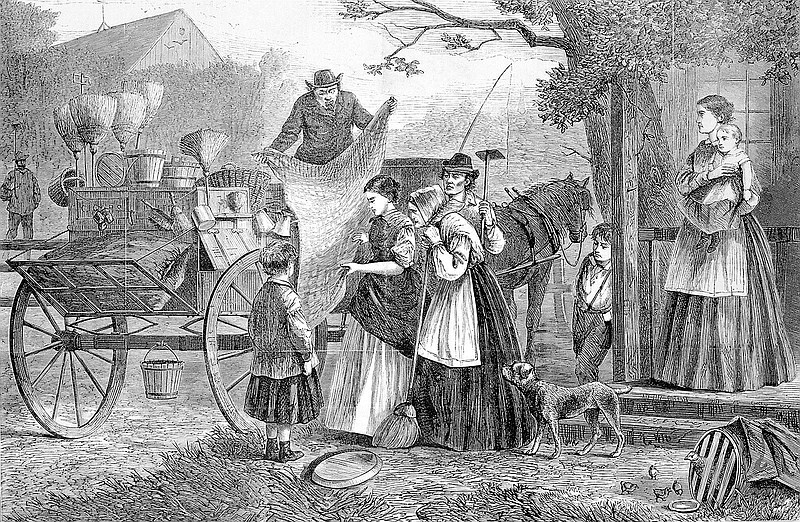Between 1880 and 1920 two million Jews emigrated from Eastern Europe to the United States to escape anti-Semitism and create a future for themselves and their families. Two-thirds settled in large northeastern cities. Some found their way to Chattanooga.
The Hebrew Immigration Aid Society (HIAS), founded in 1881 in New York City, directed many early arrivals to the Southern and Western United States for economic opportunities.
Halman and Reuben Blumberg established a peddler supply business in Chattanooga in the 1890s. Through HIAS, the Blumbergs brought 40 young Jewish immigrants to Chattanooga. To put them in business, the Blumbergs paid their railroad fare, supplied them with goods, granted them credit and assigned each a territory.
Initially, the peddlers' lives were lonely and difficult. The first to emigrate often left their families in Europe until they could save enough money for their passage. Typically, the peddler would leave Chattanooga early Monday morning and return Friday afternoon in time to observe the Jewish Sabbath.
There were no automobiles, and roads were poor. Some traveled to their territories by train or river boat. They walked from farmhouse to farmhouse carrying their pack (pekl) on their backs.
After saving a little money, they bought a horse and wagon to increase their businesses. Before learning English, they opened their packs and let the customers point to what they wanted. They listened and learned. The peddlers often carried pictures of merchandise and returned on their next trip with the ordered items. Many gave small gifts for referrals to new customers.
Friendships were made. Often the farmers would feed the peddlers, and the last customer of the day might offer them lodging for the night. Sometimes they would discuss the Old Testament, an area of common interest. However, the peddlers carefully avoided being proselytized.
The peddlers were successful because they served an important economic function, saving rural families a day's travel to and from Chattanooga. As they prospered, some peddlers opened general stores in the small towns and became part of the community.
But the advent of the automobile began to change things, and Chattanooga was booming. The population of Hamilton County increased from 61,695 in 1900 to 115,954 by 1920. Recognizing new business opportunities, former peddlers opened a variety of retail stores as well as other businesses.
Jewish life in Chattanooga expanded accordingly. Once established, peddlers typically brought family members from Europe and soon had a large presence here. They helped their relatives get started. By 1918, the Jewish population in Chattanooga was estimated at 1,400.
The peddlers aspired to realize the "American Dream" of achieving success for themselves and their families unhampered by the barriers of Europe.
Their impact is seen in Chattanooga through descendants. After arriving from Lithuania in 1888, Max Brener became a peddler in Sand Mountain, Ala. He opened a retail store in 1896 on Market Street in Chattanooga and later moved to Main and Market, where he established Brener and Rubenstein. His grandson and namesake, Dr. Max Brener, is a retired dental surgeon.
Isaac Lebovitz emigrated from Poland in 1901. His territory was Sand Mountain and the outskirts of Chattanooga. He opened a tavern on Main Street and then a retail store at Sixth and Market streets. His son Mose and nephew Joel Solomon began with movie theaters (Independent Theaters) and progressed to co-own Chattanooga's first shopping center, Eastgate. The downtown federal building is named for Joel Solomon. Isaac's grandson Charles Lebovitz continued the business, establishing CBL and Associates.
Robert Siskin was another peddler with descendants in Chattanooga. He came here from Lithuania in the 1890s and went into the scrap metal business in 1914, establishing Siskin Steel. His sons Mose and Garrison formed the Siskin Foundation, the forerunner of both the Siskin Children's Institute and the Siskin Hospital.
My grandfather, Hyman Winer, arrived from Latvia in 1892. His territory was Meigs County, and in 1896 he opened a general store in Decatur. He moved to Chattanooga, and in 1903 opened a clothing store on Market Street and later Winer's Department Store on Main Street.
In Europe Jews heard that in America the streets were paved with gold - the golden "medina" (country).
Instead they found golden opportunity.
They realized the American dream of freedom and the opportunity through hard work to achieve success for themselves and even more for their children and grandchildren.
Sanford Winer is a retired CPA and the grandson of two peddlers. For more, visit Chattahistoricalassoc.org.
